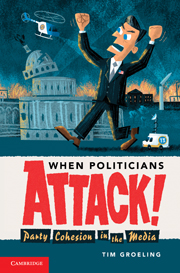Conclusion: Uncircling the Firing Squad
Party Cohesion in a New Media Era
Published online by Cambridge University Press: 05 June 2012
Summary
His first job, Nick Williams thought, was to separate the [Los Angeles Times] from the Republican Party, to gain some degree of independence in coverage of politics (old-time Times readers were stunned during the 1960 national campaign when the Times covered not just Richard Nixon but Kennedy as well; the idea of printing what a Democrat was saying about a Republican was unheard of).
– David Halberstam, The Powers That Be (1979, 286)INTRODUCTION
During the 83rd Congress, several Republican senators died in office, giving Democrats a numerical advantage in the number of seats in the chamber. Despite their unexpected new “majority” status, however, the Democrats decided not to take official control of the chamber, uncertain that there was advantage in shouldering such responsibility. Previous chapters give substantial support to this uncertainty; specifically, I argue that unified control of government has been, at best, a mixed blessing in recent years, particularly for the president's party in Congress.
The central paradox of this book is that the power associated with unified control of government makes the governing party more vulnerable: In a form of political jujitsu, the opposition party can turn the governing party's own strength against it. The governing party is powerful enough to be held responsible for the output of government but is generally too weak to achieve its goals over the minority's objections.
- Type
- Chapter
- Information
- When Politicians AttackParty Cohesion in the Media, pp. 183 - 204Publisher: Cambridge University PressPrint publication year: 2010

